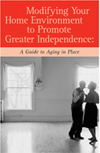Staying In Our Own Homes
Want to stay in your home?
Gretchen Heuring | ElderThink | 12.12.09
According to the NAIPC (National Aging In Place Council) staying in your own home for an extended period is more possible now than ever before. They say,
"In the past, if someone had difficulty living by themselves, it was a signal that now was time to move in with family or go to a nursing home. But, for most people, that no longer is the case. Today, you can live on your own for many years, even as you grow older and start needing help with everyday tasks. This is called “aging in place.”
It's important to understand available resources and to make a plan for this period of your life.
Thanks to the Older Americans Act, there are resources available for Seniors regardless of their income. Many programs rely on the time and energy of volunteers. Other programs are funded by tax dollars and donations are encouraged but not required.
Senior Resource Specialists
In most communities, Senior Resource Specialists and Community Care Coordinators can be found in Senior Centers or Community Centers. Senior Resource Specialists offer consultation and referral to older adults and their families. They are available to discuss your specific situation, clarify your needs and link you to services and solutions in your community. They can help with housing information, financial assistance, home care options, legal aid, caregiving support and other resources. Contact your local Senior Center or Community Center for more information. Here's how:
The US Administration on Aging (AoA) offers a free ElderCare locator. By entering your zip code, you can find the nearest source of information and support.
"Long Term Care" can be in your home or somewhere else
The idea is to maximize independence and make it possible for you to stay in your own home. Long-term care is needed when you have a disability or chronic illness that causes you to need some help with everyday activities.
A long term care program is a good idea when you need help with one or more of the following six key activities:
Bathing, dressing, using the toilet, moving to or from bed or a chair, caring for incontinence, and eating. These are called the critical activities of daily living.
The cause of needing some help can be physical or due to memory loss or confusion.
The caregiver for these sorts of problems does not need to be a skilled professional, but could be a family member, another member of the community, or a paid home care worker.
Need for care in your own home can be short or long term
Some people need care for a short time, while they are recovering from an illness or injury. Others may need care on an ongoing basis.
The disability can progress requiring more skilled care in a nursing home or some other facility capable of providing more extensive support. >>More
Wellness can be preventative
It is known that proper diet and adequate exercise can keep people healthy longer. Good muscle tone is the secret to good balance and fall prevention. People with strength in their back and legs are much less likely to fall and break a hip.
We know that good nutrition protects us against a variety of illnesses and can prevent chronic diseases such as diabetes or heart disease.
Live longer, live well!












